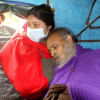We can’t treat dengue patients with so few nurses

At a time when the dengue outbreak is taking lives every day and hospitals are getting overwhelmed with patients, we are again reminded of the acute shortage of doctors, nurses and other health workers in public hospitals. A report in this newspaper gives a grim picture of the dengue wards of Dhaka Medical College Hospital (DMCH), the largest public hospital in the city. It is unthinkable that there are only four nurses per shift looking after 100 patients daily, with the numbers reaching 200 at times. It goes without saying that nurses are the ones who carry out follow-up instructions for doctors and have to be on constant alert for any changes in patients' condition. A shortage as severe as this obviously affects the care and recovery of patients.
Even during regular times, our public hospitals do not have enough nurses or doctors, anaesthesiologists, surgeons, gynaecologists and other healthcare staff. This paper has reported innumerable times the manpower crisis in district public hospitals, where patients cannot get proper care and are often forced to go to private facilities where costs are often beyond their means.
In 2020, there were approximately 73,043 registered nurses while the estimated demand was for 3 lakh. We have nursing institutes but many nurses opt for the private health sector or overseas jobs where the pay is better. In recent years, the government has tried to attract more nurses by offering better pay and benefits, but clearly, it is not enough to ensure an adequate inflow of nurses in public hospitals.
The government, therefore, must strengthen nursing and midwifery education and increase the capacity of nursing institutes. Policymakers must review the curriculum, faculty and teaching methods, and where necessary, reform them so that the skills of nursing graduates match the needs of the health sector. Moreover, they must focus on recruiting more nurses, establishing more nursing colleges, and providing adequate incentives, financial and non-financial, to persuade them to join public hospitals so that patients are better served at times of health emergencies.


 For all latest news, follow The Daily Star's Google News channel.
For all latest news, follow The Daily Star's Google News channel. 










Comments